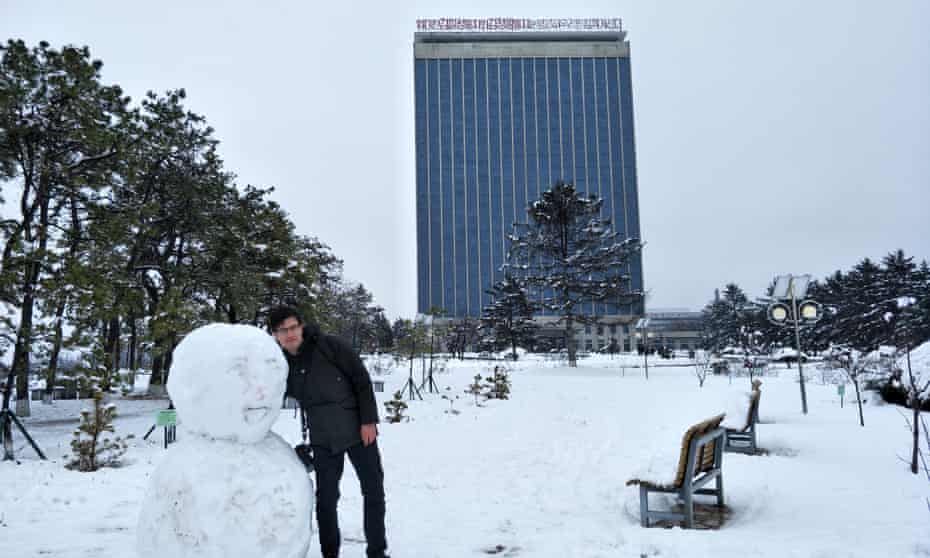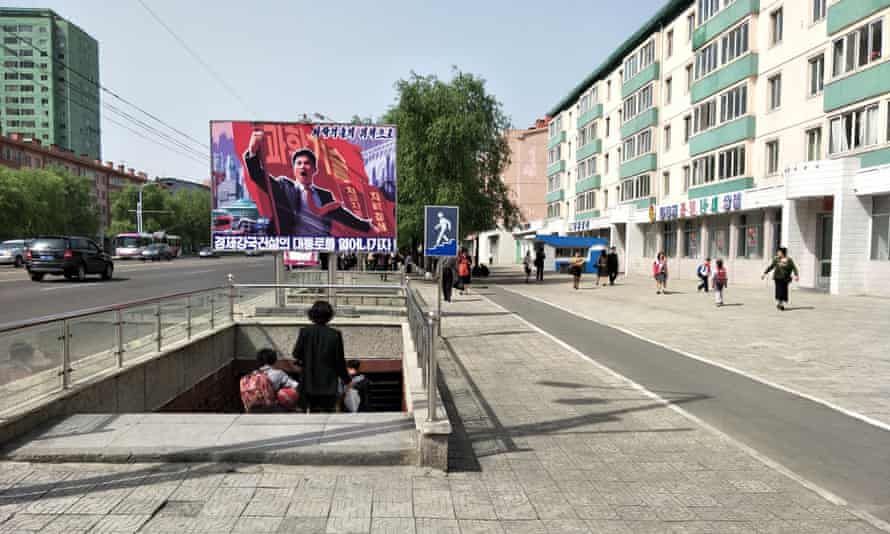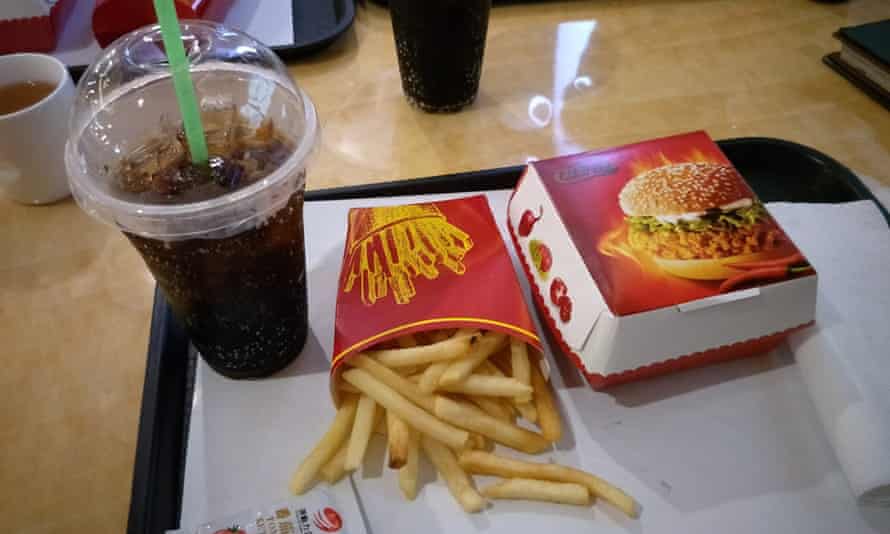I'm the only Australian living in North Korea. Let me tell you about it
This article is more than 3 years old
Alek Sigley
North Korea is a country in transition, moving from isolation to fast food, smartphones and plastic surgery
 Alek Sigley posing with a snowman on the campus of Kim Il-Sung University, Pyongyang Photograph: Alex Sigley/Tongil Tours
Alek Sigley posing with a snowman on the campus of Kim Il-Sung University, Pyongyang Photograph: Alex Sigley/Tongil ToursSun 31 Mar 2019 11.15 AEDT
466
Many people would balk at the idea of a westerner setting foot in North Korea, which is known internationally for its nuclear weapons, human rights record and its highly regimented, militaristic society.
They might be somewhat shocked to hear then, that one young Australian – that’s me – would give up two years of his 20s to study at Kim Il-sung University, North Korea’s top university, in the country’s capital, Pyongyang.
And perhaps they’ll be curious to hear what life in Pyongyang is like as one of only a handful of long-term western residents, one of only three western students, and the only Australian in the entire country.
Advertisement
I am well aware that my experiences are very much those of a foreigner. But I do think I’ve gleaned some invaluable insights into how Pyongyang residents live, work and play.
I had been interested in socialism ever since studying the Russian Revolution at high school, while my sinologist father, Chinese mother and childhood love of Japanese anime had sparked a passion for Chinese and Japanese.
I went on to study in China and lived on the same dormitory floor as the North Korean contingent. I became intrigued by their lapel pins depicting their national leaders and the North Korean flag stickers on their doors (no other students did this).
The interactions I had with these students really piqued my curiosity – they were completely at odds with the stereotypical view of a “brainwashed” people.
I soon began learning all I could about everyday life in the country, from its architecture and fashion to how its people viewed the world. Eventually, I managed to arrange a trip to Pyongyang.
I became particularly close to two Koreans who worked for a local tour company, and in partnership with them founded my own tour operator specialising in educational tourism to North Korea, Tongil Tours, through which I began to make regular trips to the country leading groups of western tourists.
 Propaganda above a road underpass in Ryonghung, Pyongyang, North Korea. Photograph: Alek Sigley/Tongil Tours
Propaganda above a road underpass in Ryonghung, Pyongyang, North Korea. Photograph: Alek Sigley/Tongil ToursAfter finishing my degree in Asian studies, I decided to take my interest in North Korea to postgraduate level. Pyongyang seemed a natural option, and with my North Korean friends’ help, I began my master’s in contemporary North Korean literature in April 2018.
As a long-term foreign resident on a student visa, I have nearly unprecedented access to Pyongyang. I’m free to wander around the city, without anyone accompanying me. Interaction with locals can be limited at times, but I can shop and dine almost anywhere I want.
North Korea today is in transition. Despite heavy sanctions, Pyongyang has a small but growing consumer class, due in part to government policies to liberalise sections of the economy.
Dining out is an important manifestation of this new spending power. Among restaurants I have visited along with other foreign students is a trendy conveyor belt hot pot restaurant, where diners can choose from more than 50 ingredients – from shiitake mushrooms to macaroni – for their broth.
This restaurant is always packed at weekend lunchtimes, with the clientele sporting fashions that wouldn’t look out of place in Shanghai or Seoul. We’ve even spotted young people who’ve clearly had plastic surgery.
Naturally, Pyongyang has a wide variety of excellent Korean food on offer, from bulgogi to bibimpap. But we’ve also found conveyor belt sushi and some pretty authentic Chinese restaurants.
There’s a fast food joint whose waitresses told me their food was “just like KFC”, and another that serves hamburgers and French fries. The burger was pretty close to McDonald’s, only with raw and not pickled cucumber slices.
 A fast-food restaurant named Myohyanggwan in Pyongyang, which serves McDonald’s-style food. Photograph: Alek Sigley/Tongil Tours
A fast-food restaurant named Myohyanggwan in Pyongyang, which serves McDonald’s-style food. Photograph: Alek Sigley/Tongil ToursWhen it comes to shopping, imported goods include everything from Haribo gummy bears and New Zealand beef to Adidas sportswear and Dove bodywash.
Locally manufactured products are improving in quality – a few years ago all the paper was grey and coarse, but now the shops are full of notebooks with bleached white paper (although the rockets and Pyongyang monuments on the covers still mark them out as North Korean).
The government has been encouraging greater use of technology, and while locals are still unable to access the internet, their own internal network is becoming more developed.
The Pyongyang Metro is always full of “phone zombies” staring intently at games, movies or the news. Pretty much the only person I’ve met who doesn’t have a smartphone is my 73-year-old literary theory teacher, who has stuck with her 2000s Nokia-style device.
But perhaps the most insightful experiences I’ve had have been talking with various locals.
A taxi driver, for example, told me he knew Australia was a popular tourist destination. He knew we had backed the “US imperialists” in the Korean war, which his grandfather had fought in, but said he hoped I would be the first of many foreigners to live in his home town.
In the dormitory, I shared a room for four months with a local student majoring in English. In most ways, he wasn’t too different from a typical bloke in his early 20s. An avid football fan, he loved Neymar and Messi, whom he followed alongside the April 25 Sports Club, a local Pyongyang team. He enjoyed the odd drink (and a more regular cigarette).
He had a particularly keen interest in international politics, and dreamed of one day “working in the foreign ministry of a unified Korea”.
But unlike your typical student, my roommate’s proudest moment from his uni days was when he represented the university in a military parade watched by Kim Jong-un.
He told me of the gruelling training needed to get his goose-stepping up to standard, but also of the bonds he forged with his fellow marchers and the sense of pride and achievement he felt afterwards. He always kept a photo from that day on his desk.
He once asked me whether Australia was a one-party state. I was taken aback, but did my best to explain our multi-party system. He was particularly interested to hear that we have a communist party, but seemed slightly disappointed when I told him how small it is.
Now that he’s moved out of the dorm I’m unable to contact him again – foreigners’ phone numbers are on a separate network and meeting locals without an express reason is generally frowned upon. Saying goodbye was emotional.
But if it’s any consolation, the fact that an Australian and a North Korean could happily share a room for four months does show that there’s a better way. We can get along.
No comments:
Post a Comment